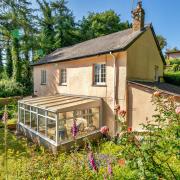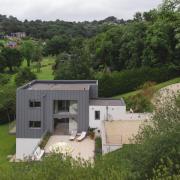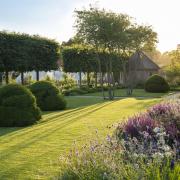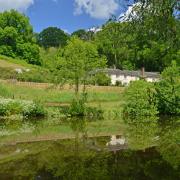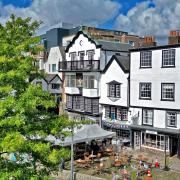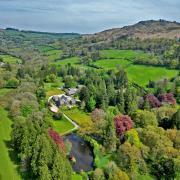When I first moved to Devon, one of the first places I visited was a nearby garden centre in Ottery St Mary. It was then called Otter Nurseries and much of my garden became home to their plants.
My wedding bouquet was made using antirrhinum and gypsophila from my borders, and a Magnolia Susan given to me to celebrate my wedding day has grown into a beautiful specimen that blooms without fail every spring. I often felt that the main reason for my mother-in -aw’s visits was to spend a day at Otter to fill her car with plants and garden paraphernalia before hotfooting it back to Berkshire!
I took my children to meet Father Christmas there. I remember one year when he arrived by helicopter. The fact that he had a strong Irish accent very similar to a chap who lives in my village was never questioned by the kids.

On learning that the business is celebrating its 60th anniversary during 2024, it seemed a good time to find out about the history of this mainstay of gardeners - not just in Devon, but also now in Somerset and Hampshire.
The names that frequently come up when talking about Otter are Malcolm and Marilyn White. Regarded as true gardening experts with an innate love of plants and planting, it was back in 1964 that they decided to make a living from growing.
They took out a bank loan to buy a field in Gosford Road just outside the town of Ottery, where they lived in a second-hand mobile home, growing mainly lettuce, cabbage and carrots which they took to the local markets. Then they started selling bedding plants directly to the local community, and as more and more customers arrived to stock up their gardens, so their business flourished.

Successful family-run businesses often outgrow the founding family, but Otter remains firmly grounded in its roots. Malcolm and Marilyn have pretty much retired now - although for many years they could be found helping out at busy times – but their daughters Jacqui Taylor and Cathy White have taken the helm as managing director and IT director.
Hard work is in the family’s nature. Jacqui says she has never forgotten how she became almost literally immersed in plants from an early age. 'I used to get up early before school to help mum make up the hanging baskets. On more than one occasion I went to school unaware that my hair was covered in moss!'
Jacqui’s own children Sabine and Arron are very involved in the business, Sabine on the creative side and Arron overseeing the plants. The latest recruit is Cathy’s daughter Lara, who is making her mark in stock control.

Some of the longevity of Otter can be attributed to spotting opportunities. Jacqui recalls how Malcolm and Marilyn realised that customers buying young bedding plants often wanted somewhere suitable to bring them on before planting out in warmer weather. 'They started selling greenhouses, not the fancy ones you see these days, but very simple, small models that could fit in most gardens.'
The idea was sound, but many customers were a bit wary of building a greenhouse, with so much glass to handle. So Marilyn’s dad, Russ, stepped in. He was retired and keen to help the young couple make a success of their fledgling business.
'Russ was adamant that more people would buy greenhouses from Otter if we also offered an installation service. He brought himself out of retirement to become our very first greenhouse installer. He didn’t want to be paid for his work, but he was more than rewarded with coffees and sponge cakes from delighted customers!'

I ask Jacqui how she thinks gardening has changed during the past 60 years. 'Bedding plants have long been popular, which is why my parents grew and sold them. Plants like salvias, marigolds, alyssum, lobelia, perhaps much more formally planted once than they are now. Gardens were often clearly sectioned in the 1960s and 70s, so you’d have your vegetable patch and fruit bushes, your cottage garden, possibly a rose garden, all separate. Now it’s all more integrated, growing flowers in amongst the veg, mixing hardy plants and shrubs. And people use their outdoor space better, making the garden an extension of the home, using decking and comfy furniture.'
With people focussing increasingly on their gardens, Otter branched out and opened its second garden centre in Torquay in 1984. 'It was next to a new WH Smith ‘Do-It-All’ store, which was opened by a very glamorous Miss World. We had a live otter called Bea to open ours!'
It was another 12 years before the third branch opened in Plymouth, swiftly followed by Lymington, which was a growing nursery as well as a plant centre.

'A nursery is different to a garden centre, as it’s where plants are actually grown. We’ve always been growers, and while we have seven garden centres now, after adding Wincanton, Taunton and Jack’s Patch at Bishopsteignton, we still run three nurseries. In fact, we grow around 80 percent of the plants we sell. The benefit this gives us is the ability to control the quality and range.'
One success story was Claire Hannah, a beautiful camellia first propagated by Otter in 1995. It’s a beautiful coral pink, with an irregular semi-double of 26 petals. Fittingly for the 60th celebrations, Claire Hannah has recently been added to the International Camellia Registry, and now features in the National Camellia Collection at Mount Edgcumbe, just on the Cornish side of Plymouth Sound.
By their very nature, gardening and garden centres might seem to be environmentally friendly places and Otter has made strides in adding solar panels and biomass boilers as well as utilising rainwater harvesting.

But there’s more to do! Take the humble plastic pot, which revolutionised gardening back in the 1960s but is now out of favour as we’ve learnt about the negative impact of plastic on the planet, particularly the oceans. Otter has a well-established scheme for customers to bring back pots which can then be reused by other customers or recycled. The company has just invested in an impressive new baler which compacts plastic pots more efficiently before they are taken to a recycling centre to be shredded, made into balls and used for new products, including furniture.
'And we’re planning to start baling other materials such as soft plastics,' Jacqui says. 'So any shrink wrap and compost bags we use within our garden centres can be recycled more efficiently. In the near future, we’ll be offering customers the opportunity to bring back their compost bags, too.'
Compost itself has become news, as environmentalists are concerned about the negative impact of peat extraction. With peat compost being banned by the end of 2024 for amateur gardeners and December 2026 for professional growers, Otter has been busy working behind the scenes with suppliers to cut down the use of peat, both in the compost sold and that used in the growing nurseries.

'It’s not straightforward, because peat-free compost dries out quicker than peat and needs additional fertiliser. But our trials are proving pretty successful and we’re happy to pass on our own experiences to customers as they also move away from using peat.'
From a second-hand mobile home to seven garden centres and three nurseries, Otter has shown it’s here for the foreseeable future. Growing is in the family’s DNA, and their beautiful plants are very much part of Devon’s residential landscape.









